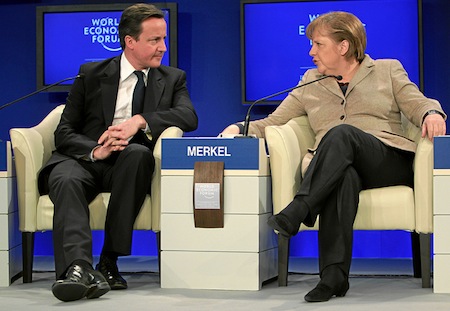
Over at EurActiv, Dr. Michael J. Geary, a friend and colleague at the Woodrow Wilson International Center for Scholars, and I have written a piece placing UK prime minister David Cameron’s speech from Wednesday in greater context in respect of existing European Union structures and the longstanding 40-year history of the United Kingdom’s tumultuous relationship with the EU and its predecessor, the European Economic Community.
![]()
![]()
You can read it here.
We note, among other things, that Cameron’s latest gambit is well-placed within the UK’s long-standing discomfort as a member of Europe:
In fact, if Cameron’s latest gambit has a sense of déjà vu to it, it’s because it comes almost directly out of the political playbook of former Labour prime minister Harold Wilson.
Just one year after [Edward] Heath secured British membership in the EU’s predecessor, the European Economic Community, Wilson sought to renegotiate the original deal and, in 1975 held a referendum on whether Britain would remain in the Community.
But British-EU relations have always been troubled, and even the British accession to the EEC is poised with original sin. Denied membership to the EEC twice during the 1960s by French president Charles de Gaulle, Britain finally gained entry in 1973 after months of protracted negotiations between pro-European Conservative prime minister Edward Heath and de Gaulle’s successor, Georges Pompidou….
In some ways, British truculence goes back well beyond the era of European Union – in 1931, the United Kingdom was the first major European power to ditch the gold standard, goosing its own economic recovery while leaving the economies of Germany and France clamped to 24-carat chains.
We also place the speech in the context of what are likely to be negotiations, initiated by German chancellor Angela Merkel, for a new EU treaty that attempts to locate greater fiscal policymaker power with Brussels, at least among the eurozone nations:
[Merkel], who wants a new EU treaty granting greater fiscal control to Brussels (and to Berlin, in no small part), may be willing to trade more opt-outs to Cameron in exchange for green-lighting further integration for the core eurozone countries.
Cameron may also be hoping that he can use negotiations on the still uncertain EU budget for 2014 to 2020 as a bargaining chip.
Negotiations wouldn’t begin in earnest until after Cameron’s reelection in 2015 (still a questionable proposition) and after German federal elections expected in September 2013, so it’s impossible to know whether the 2014 budget or a new Merkel-led treaty effort would even come into play.
After all, it’s not clear if the eurozone will exist in its current form through the next five months, let alone five years. But if Merkel and French president François Hollande balk at Cameron’s push, will it be enough for him if he manages to, say, renegotiate an opt-out from the EU’s working time directive, or perhaps repatriate additional justice policymaker powers from Brussels?
